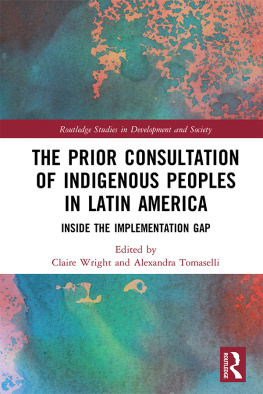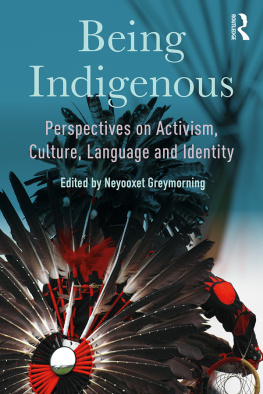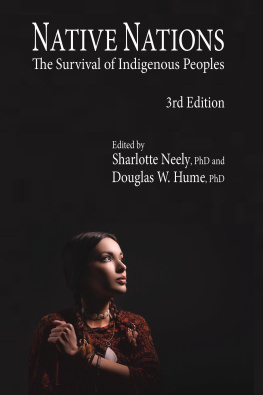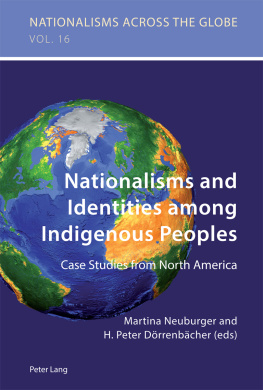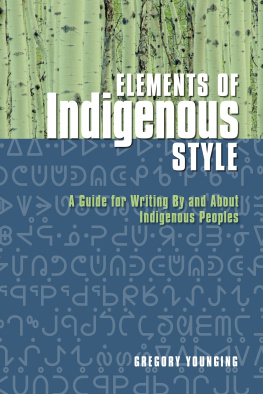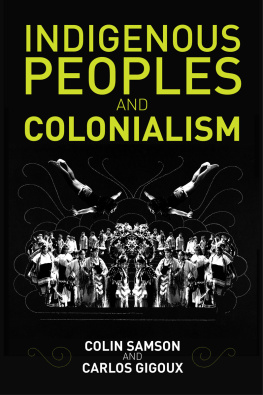INDIGENOUS PEOPLES
AND POLITICS
Edited by:
Franke Wilmer
Montana State University
A ROUTLEDGE SERIES
INDIGENOUS PEOPLES AND POLITICS
FRANKE WILMER, General Editor
INVENTING INDIGENOUS KNOWLEDGE Archaeology, Rural Development, and the Raised Field Rehabilitation Project in Bolivia Lynn Swartley | STORIED VOICES IN NATIVE AMERICAN TEXTS Harry Robinson, Thomas King, James Welch, and Leslie Marmon Silko Blanca Schorcht |
THE GLOBALIZATION OF CONTENTIOUS POLITICS The Amazonian Indigenous Rights Movement Pamela L. Martin | ON THE STREETS AND IN THE STATE HOUSE American Indian and Hispanic Women and Environmental Policymaking in New Mexico Diane-Michele Prindeville |
CULTURAL INTERMARRIAGE IN SOUTHERN APPALACHIA Cherokee Elements in Four Selected Novels by Lee Smith Katerina Prajnerova |
| Published in 2005 by | Published in Great Britain by |
| Routledge | Routledge |
| Taylor & Francis Group | Taylor & Francis Group |
| 270 Madison Avenue | 2 Park Square |
| New York, NY 10016 | Milton Park, Abingdon |
| Oxon, OX14 4RN |
2005 by Taylor & Francis Group, LLC
Routledge is an imprint of Taylor & Francis Group
Transferred to Digital Printing 2010
International Standard Book Number-10: 0-415-97288-4 (Hardcover)
International Standard Book Number-13: 978-0-41597-288-8 (Hardcover)
Library of Congress Card Number 2004024562
No part of this book may be reprinted, reproduced, transmitted, or utilized in any form by any electronic, mechanical, or other means, now known or hereafter invented, including photocopying, microfilming, and recording, or in any information storage or retrieval system, without written permission from the publishers.
Trademark Notice: Product or corporate names may be trademarks or registered trademarks, and are used only for identification and explanation without intent to infringe.
Library of Congress Cataloging-in-Publication Data
Ulloa, Astrid.
The ecological native : indigenous peoples movements and eco-governmentality in Colombia /Astrid Ulloa.
p. cm. -- (Indigenous peoples and politics)
Includes bibliographical references and index.
ISBN 0-415-97288-4
1. Indians of South America--Colombia--Politics and government. 2. Indigenous peoples--Ecology--Colombia. 3. Indians of South America--Civil rights--Colombia. 4. Indians of South America--Colombia--Public opinion. 5. Public opinion--Colombia. 6. Colombia--Politics and government. 7. Colombia--Environmental conditions. I. Title. II. Series.
F2270.1.P63U55 2005
304.2089980861--dc22
2004024562
ISBN10: 0-415-97288-4 (hbk)
ISBN10: 0-415-88405-5 (pbk)
ISBN13: 978-0-415-97288-8 (hbk)
ISBN13: 978-0-415-88405-1 (pbk)
| Visit the Taylor & Francis Web site at
http://www.taylorandfrancis.com
and the Routledge Web site at
http://www.routledge-ny.com |
For my mother and my daughter
Lilia and Naira
Contents
This text is only a part of a research process. During the process, I received support from many people and I am very grateful for their help. However, I apologize if I forget someone. I start by thanking professors from UCI (Bill Maurer, Mike Burton, Alison Brysk, Teresa Caldeira, Helen Ingram and Frank Cancian) for their comments, suggestions, and discussions during the whole process. I thank them for all their help and patience.
Support during my research was provided by the University of California, Irvine, the Inter-American Foundation, Instituto Colombiano de Antropologa e Historia (ICANH), and Instituto Colombiano para el Desarrollo, la Ciencia y la Tecnologa (Colciencias). Support during the writing process also came from a Regents Dissertation Writing Fellowship, University of California, Irvine. I want to thank the Instituto Colombiano de Antropologia e Historia (their directors, Mara Victoria Uribe and Mauricio Pardo, and all my coworkers) for all their support in this process.
Sandra Durn, Luis Cayn and Juan Carlos Orrantia helped me in the collection of archival data. Claudia Campos contributed in the analysis of environmental implications of governmental and indigenous policies. Margarita Flrez helped me with the understanding of the international and national legal contexts. Andrs Barragn helped me with the preparation of the index. I am very thankful for all their help.
Walter Sondey (English Department, UCI) helped with my English style in the final version of this text, giving it a better textual touch. I thank him, for all his help and love.
Naira Bonilla (my daughter) was an important part of this process because she was always there for me. All the members of my family, Lilia Cubillos (my mother), Martha Ulloa, Zoraida Ulloa, Edgar Ulloa, Jorge Badel, Jim Brannies, Lynda Ulloa-Thompson and Andy Salazar helped and supported me throughout this process. They made my life easy and lovely. I am very thankful for having this wonderful family and I really appreciate their patience and help.
Finally, I thank the members of the indigenous organizations, Organizacin Indgena Gonawindua Tayrona-OGT and the Consejo Territorial de Cabildos-CTC of the Sierra Nevada de Santa Marta (SNSM), and their leaders Arregocs Conchacala, Cayetano Torres, Danilo Villafae and Margarita Villafae, who allowed me to participate in their own meetings and meetings with different institutions, and to discuss the indigenous peoples political situations. I want to thank Milena Tafur, Eduardo Rico and Julio Barragn (advisors of the indigenous organizations) who always shared their perceptions about the situations of indigenous peoples of the SNSM. lvaro osorio and Margarita Bravo gave of their time, home and lives during my fieldwork in Santa Marta.
POINTS OF DEPARTURE
The indigenous peoples of Colombia have become important and powerful interlocutors within national and international political arenas that allow them to rethink those political spheres and their predominant conceptions of nation, citizenship, democracy, development, and especially environment. Although indigenous peoples have been stereotyped during the last five hundreds years as savages, evil miscreants, or grown-up children, in the last few decades indigenous movements political struggles have succeeded in transforming such representations. Many in Colombia and the international community now view indigenous peoples as ecological natives who protect the global environment and give us all hope in the face of the environmental crises brought about by western-style development. Consequently, representations of indigenous peoples in the developed world have changed from the savage colonial subject to the political-ecological agent.
The main goals of this study are to analyze the construction of indigenous peoples ecological identity; to reconstruct the historical emergence of the relationship between indigenous peoples and environmentalism; to assess critically the consequences that this relation creates for specific indigenous peoples communities; and to determine how the cultural and environmental politics of indigenous peoples movements have impacted national and transnational environmental politics by promoting different notions of nature and development. I am not looking for singular causes or trying to validate a theory, but rather I want to reconstruct the different networks, conditions of emergence, and implications (political, cultural, economic and social) of one specific event: the consolidation of the relationship of indigenous peoples and environmentalism.


